Indian State Should Focus on Unconventional Methods: Jamal Nasir Baloch
Iran’s ‘Desert Execution’ Policies in Balochistan: A Systematic Violation of Human Rights

In the early morning hours of January 29, 2025, Iranian military forces executed Abolqasem (Abul) Bamari, a Baloch man, in Delgan, Balochistan. According to local sources, Bamari was shot while lying on the ground in a surrendered position. This tragic event, captured on video and widely circulated on social media, is part of a growing pattern of so-called “desert executions”—a brutal and unlawful tactic employed by Iranian forces against Baloch citizens.
The term “desert executions” refers to extrajudicial killings conducted by military or paramilitary forces in isolated desert areas. These executions typically occur without formal legal proceedings or judicial oversight. Victims are often unarmed and have surrendered to authorities, offering no resistance. This form of execution is especially egregious because it completely disregards the principles of due process, basic human rights, and legal protections.
Since the 1979 Iranian revolution, desert executions have become a notorious practice used by Iranian forces in Balochistan. Despite the frequency of these incidents, there has been little to no accountability for the perpetrators. Officers responsible for these killings are often reassigned to other regions, rather than facing prosecution. For families of the victims, their efforts to seek justice are often ignored, adding to the cycle of impunity.
The Iranian military’s ongoing violence against the Baloch population is exemplified by the case of Abul Bamari, whose death is part of a broader pattern of violence. Since 2020, at least five Baloch citizens have been executed in desert shootings under the pretext of drug trafficking, despite being unarmed and offering no resistance. These killings were carried out without any judicial oversight, further highlighting the Iranian regime’s disregard for human rights and legal standards.
This systematic violence is not new. Several recent cases underscore the Iranian military’s brutal tactics:
- On November 13, 2020, Alireza Tootazaei, a Baloch man from Geraghah village in Zahedan, was executed in Minab, despite being unarmed and surrendering peacefully to authorities. The charges of drug trafficking were used as a pretext for his execution.
- On June 7, 2021, two Baloch citizens, Abdulreza Shahbakhsh and Karim Bakhsh Shahbakhsh, were similarly executed in Fahraj under charges of drug trafficking.
- On July 9, 2024, Zebihollah Mohammadzehi from Chahkichi Delgan was also killed in a desert execution near the Zahklot to Rudbar region, despite having surrendered to military forces.
These incidents are just a few examples of the ongoing pattern of desert executions that have left the Baloch population in constant fear of violence at the hands of the state.
The continuation of desert executions, along with other state-sanctioned human rights violations in Balochistan, highlights the urgent need for international attention and intervention. The Iranian government’s actions violate international law, including the right to a fair trial and protection from extrajudicial killings. Despite widespread documentation of these abuses, no meaningful action has been taken by the international community to hold those responsible accountable.
The international community must demand accountability for these crimes. Organisations such as the United Nations and human rights groups should increase pressure on Iran to cease these extrajudicial executions and ensure a fair legal process for those accused of crimes. The United Nations Human Rights Council (UNHRC) could play a crucial role in investigating these violations while diplomatic channels should push for greater scrutiny of Iran’s treatment of Baloch people.
Furthermore, countries that uphold human rights must support the Baloch population by offering asylum to victims’ families, increasing public awareness, and calling for sanctions against those involved in these extrajudicial killings.
The desert executions and other brutal tactics used by Iranian forces in Balochistan serve as a grim reminder of the widespread human rights violations faced by Baloch citizens. These acts of violence, often carried out in isolated desert areas, are emblematic of the Iranian government’s disregard for international law. The time for meaningful international action is now, as the situation in Balochistan continues to deteriorate under Iran’s brutal policies.









